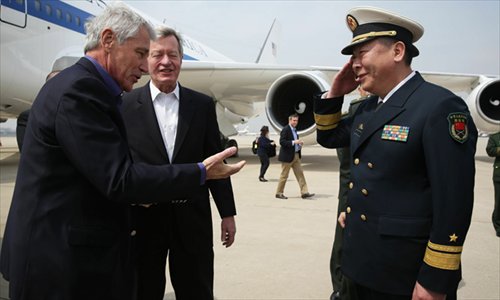Hagel tours Liaoning carrier

US Secretary of Defense Chuck Hagel (left) is welcomed by Rear Admiral Guan Youfei (right), director of Foreign Affairs Office of the Chinese defense ministry and US Ambassador to China Max Baucus (second from left) upon his arrival at Qingdao International Airport on Monday. Photo: AFP
Related report: China should offer Hagel tough welcome
US Defense Secretary Chuck Hagel on Monday paid an unprecedented visit to China's sole aircraft carrier, the first by a foreign official, which analysts say shows China's sincerity in promoting military exchanges with the US.
The visit to the Liaoning carrier at a naval port in Qingdao, East China's Shandong Province, lasted about two hours, Reuters reported.
It reported that Hagel's tour of the Liaoning gave him a close-up look at the carrier's flight deck, medical facilities and living quarters and also allowed him to speak directly with Chinese sailors.
"We didn't see every space aboard the ship. But, yes, we felt this was an honest, genuine effort to be open about this brand new capability that they're trying to develop," one US official was quoted as saying on condition of anonymity.
The carrier visit was approved by Beijing at the request of Washington, according to a report from AFP.
While the US has criticized China's lack of transparency in the military sector, this is a positive gesture by China to show sincerity in its military exchanges with the US, said Zhu Feng, a professor in international relations at Peking University.
"As China and the US are now in a relationship of strategic rivalry, this suggests that China wants to be a qualified and respectable rival," Zhu told the Global Times.
The carrier, a Soviet-era vessel bought from Ukraine in 1998 and refitted in a Chinese shipyard, is seen as a symbol of China's growing naval power.
The tour of the Liaoning started Hagel's three-day visit to China. Although he has visited Asia three times, it is his first visit to China since he became defense chief in February last year.
During the visit, the US defense chief will meet his Chinese counterpart Chang Wanquan. He is also expected to hold talks with Chinese leaders.
Hagel's carrier visit suggests that US efforts to encourage greater military-to-military ties with China are bearing some fruit, according to CNN.
However, Chinese analysts are divided on closer military ties.
Both countries have seen remarkable progress in military exchanges in terms of their level, range and depth, Zhu said.
"This suggests that the leaders of China and the US are highly aware of and concerned with the increasing chances of military clashes between the two sides and hence want more communication in military and defense," he noted on Monday.
However, a Chinese military expert, who requested anonymity, was not as optimistic as Zhu, saying that there was no substantive progress in this regard.
Liu Weidong, an expert on US studies with the Chinese Academy of Social Sciences, partly agreed.
"This is fundamentally caused by doubts and mistrust between the two powers resulting from different values and ideology as well as a reducing gap in national strengths. Japan's reluctance on China-US cooperation has also exacerbated the situation," Liu told the Global Times.
Before arriving in China, Hagel spent two days in Japan, which he said was to assure the US allies of commitment to "our treaty obligations."
Relations between Beijing and Tokyo have been chilled by a territorial dispute over the Diaoyu Islands in the East China Sea and Japan's Prime Minister Shinzo Abe's visit to the Yasukuni Shrine in December.
Hagel reassured Tokyo that the islands fall under the US-Japan Security Treaty.
"You cannot go around the world and redefine boundaries and violate territorial integrity and the sovereignty of nations by force, coercion or intimidation, whether it's in small islands in the Pacific, or in large nations in Europe," he said, using the example of Russia's annexation of Crimea.
With the Abe administration trying to ease the ban on its collective self-defense, Hagel also showed support in an interview ahead of his Japan trip.
"We welcome Japan's efforts to play a more proactive role in the alliance, including by re-examining the interpretation of its constitution relating to the right of collective self-defense," Hagel said in a written response to Japan's financial newspaper Nikkei.
Washington's support for Tokyo could also be seen in its decision to scrap plans for a navy ship to join a fleet review in Qingdao later this month after learning host China did not invite Japan to the event.
The military expert said that Hagel's reassurance actually intends to heighten tension between China and Japan to serve US strategic interests.
Zhu said although the two sides are mostly consistent in countering China and the US is using Japan against China, the accusation that the US is intentionally creating conflict between Beijing and Tokyo does not make sense.
Actually with the increasing mistrust between Tokyo and Washington, Japan seeks to rely on itself rather than its ally, although it will be hard to get out of US control, Liu said.